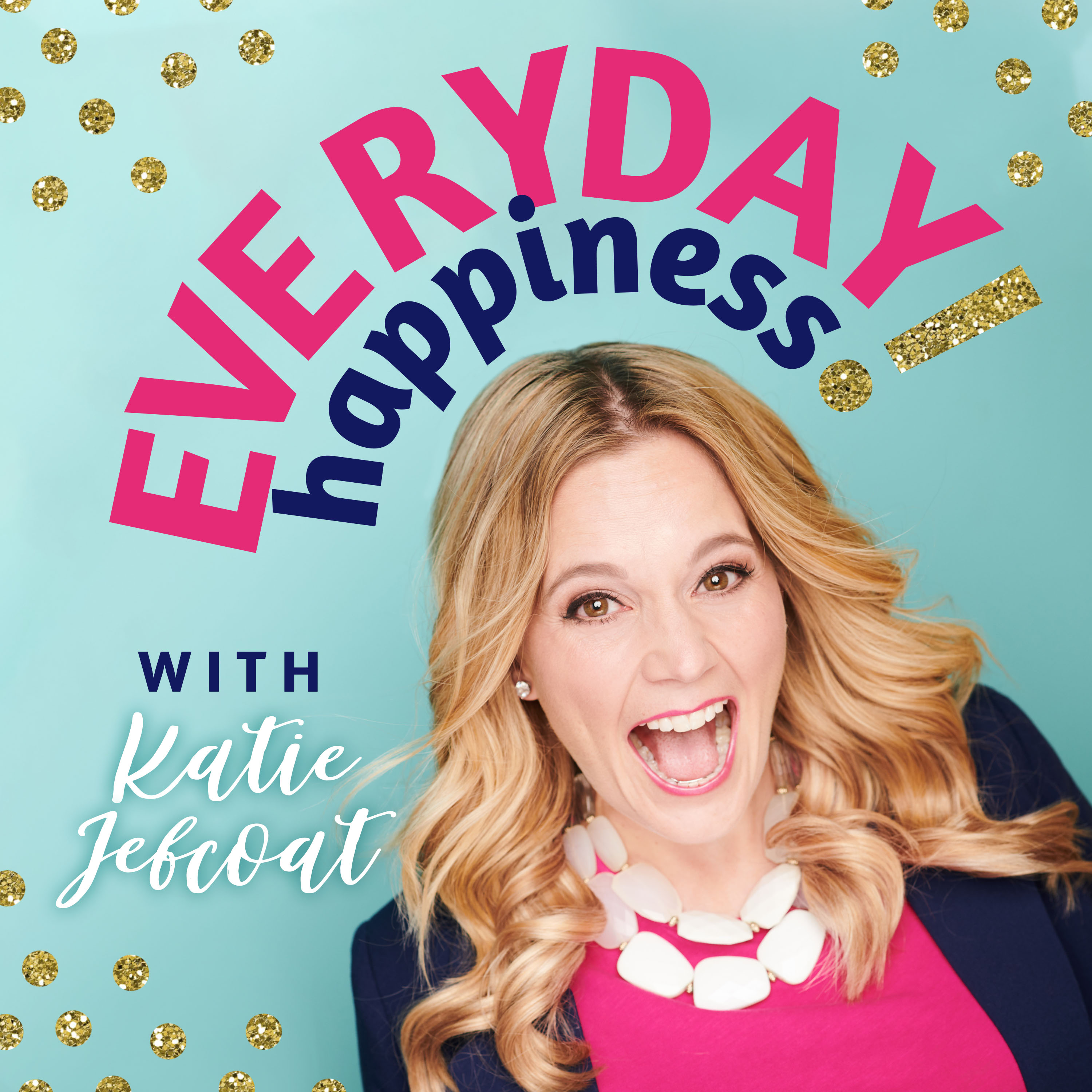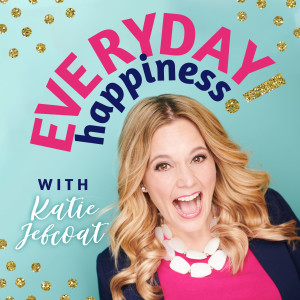
28.4K
Downloads
674
Episodes
Do you feel overwhelmed with your todo list? Is "creating fulfilling happiness" missing from that list? Everyday Happiness with Katie Jefcoat is here to help you. In 2-minutes a day, over time, you’ll discover how to reduce overwhelm and create lasting happiness through Katie’s signature method of Intentional Margins, happiness science, and musings about life. Start your day with a positive mindset. Many of us can get deep in the feeling of overwhelm. The anxiety of our own ambition can weigh heavily on our thoughts and emotions. We lay down and close our eyes at night and our chest begins to feel heavy. More items on the to-do list than the day before. How will we ever going to get off the hamster wheel of to-dos? When are we going to start living life for more than the hustle? As a recovering lawyer and passion driven entrepreneur, Katie knew something had to change. What she found is that you can have harmony, be intentionally productive and create massive impact, all at the same time - without feeling guilty. So she asked herself a simple question: "How can I get off the hamster wheel and how can I show others how to do the same? She knew she'd had a system for herself, but she’d never put it into defining words. On August 15, 2019, she sat down at her dining room table with her friend Jenna (her business bestie). Post-It notes covering the table. This is where she first defined the concept of Intentional Margins. What are Intentional Margins? INTENTIONAL MARGINS™ (n): A buffer of space and time to create harmony between your to-do’s and your priorities. Now you can get the support you need to manage your overwhelm, one little tip at a time. Regardless of the industry, Everyday Happiness blends inspiration with a pragmatic approach to finding Harmony. You'll be encouraged to throw “balance” out the window for a more achievable approach called harmony. Through Intentional Margins™, you'll be encouraged to develop what harmony means to you, by identifying your priorities at work and at home. Every day, we'll end the podcast help you feel equipped to jump off the hamster wheel of overwhelm and go out there and crush your day. --About the Host-- Katie Jefcoat is a community curator, speaker, author and motivator who supports ambitious women (and a few good men) move from feeling hectic to harmonious. As a recovering trial lawyer, she knows first hand what it feels like to have a demanding job. As an entrepreneur with a passion that lights her hair on fire and a busy family she’s in the thick of it with you. Many people strive for balance and think overwhelm is just a part of life. Sadly, the hustle culture and our never-ending to-do list is creating a life where our priorities are getting the leftover scraps of time. Katie introduces people to what she calls - Intentional Margins™ - a kind of life in which they reduce randomness, create harmony between their to-dos and their priorities and intentionally enjoy the meaningful parts of life - without feeling guilty. Without exposure to a different way, we remain stuck on the hamster wheel of to-dos and never find the “balance” we yearn for. Katie works diligently to expose her community to different ways of doing things, because she fundamentally believes we deserve to make time for our priorities. We deserve to live a life of harmony. And it’s within our control to create it. Katie curates a smorgasbord of content related to managing your calendar, handling overwhelm, setting boundaries, reducing randomness, saying no, self-care, the power of your choices, and more in her Intentional Margins™ Membership Community -- which she calls the coziest virtual coffee shop (on Facebook). Connect and learn more at www.katiejefcoat.com.
Episodes

Tuesday May 17, 2022
350-The Happiness Pie Chart Revised
Tuesday May 17, 2022
Tuesday May 17, 2022
Fourteen years after the first major scientific paper on how we can affect our own happiness, and over more than a decade more research by dozens of scientists, the original authors Kennon M. Sheldon and Sonja Lyubomirsky have reviewed the increased research in this field and revised their findings.
Transcript:
Welcome to Everyday Happiness where we create lasting happiness, in 2-ish minutes a day, through my signature method of Intentional Margins® (creating harmony between your to-dos and your priorities), happiness science, and musings about life.
I'm your host Katie Jefcoat and researchers Kennon M. Sheldon and Sonja Lyubomirsky in 2019 revised their infamous pie chart model where they said in 2005 that 40% of our happiness is found in intentional activity. They spurred on so much great behavioral science research in their initial findings that they revised their perspective in 2019. They say that “this more recent research affirms that people can affect their own happiness, via their deliberate efforts. Admittedly, however, these effects tend to be smaller than we initially believed.”
Their findings indicate that “[w]hen people change their intentional behavior – that is, doing something new that takes effort – they have a better chance of boosting their well-being and maintaining that boost than when they merely change a factual circumstance (such as moving into a new apartment, buying a car, or asking for and receiving a raise). This is because people are less likely to experience hedonic adaptation in response to life changes …[as opposed to] changes that merely substitute one stable circumstance for another”
What’s fascinating is that if people want to get happier, they have to have the “buy in”. Simply requiring a person to do things that can boost their happiness is not enough if they haven’t actually bought in.
So if we need to buy into these techniques to boost our happiness, how does hedonic adaptation play a role? Well, hedonic adaptation is when we fall back to baseline. We want to continue to stoke the fire so that we continue to experience that positive emotion of the new car, new house, new job. Maybe we won't go back to our set point if we can continue to stoke the fire.
In other words, Sheldon and Lyubomirsky find that consistent with the French saying, ‘to each his own taste’ – certain activities appear to work better for certain people (Nelson & Lyubomirsky, 2014). For example, highly extraverted happiness seekers may reap more benefits from positive activities that require interacting with others (e.g. Pressman, Kraft, & Cross, 2015), and interventions delivered via mobile phones may be ideal for younger or tech-savvy users.
This is great news. This means that we get to take the happiness boosting ingredients and create our own recipe for our fulfilled happiness.
Today, I invite you to think of one thing that makes you happy and share it with us using the hashtag #everydayhappinesswithkatie
Inspired By: Revisiting the Sustainable Happiness Model and Pie Chart: Can Happiness Be Successfully Pursued?
- Kennon M. Sheldon & Sonja Lyubomirsky (2021) Revisiting the Sustainable Happiness Model and Pie Chart: Can Happiness Be Successfully Pursued?, The Journal of Positive Psychology, 16:2, 145-154, DOI: 10.1080/17439760.2019.1689421
http://sonjalyubomirsky.com/files/2019/11/Sheldon-Lyubomirsky-2019.pdf
Get Everyday Happiness delivered to your inbox by subscribing at: https://www.katiejefcoat.com/happiness
And, let’s connect on social at @everydayhappinesswithkatie and join the community on the hashtags #IntentionalMargins and #everydayhappinesswithkatie on Instagram
Links: https://onamission.bio/everydayhappiness/

No comments yet. Be the first to say something!